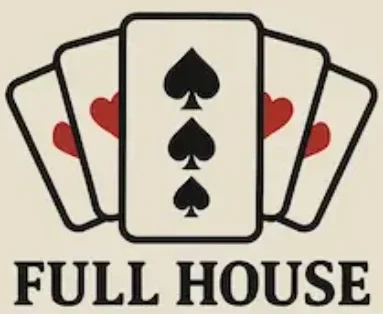Poker has fascinated players worldwide for centuries with its combination of skill, luck, and psychology. Among the many hands that players aim for, the full house is one of the most exciting and powerful. But have you ever wondered why it is called a full house in poker? What exactly makes a full house such a valuable hand, and what are the rules around it?
In this comprehensive article, we will explore the origin of the term “full house”, dive deep into what a full house means in poker, and explain why it holds a special place in the game’s hierarchy. Whether you’re a novice or an experienced player looking to brush up your knowledge, this guide will clear up all your questions about the full house in poker.
What Is a Full House in Poker?
Before exploring the etymology, let’s first understand what a full house in poker is.
A full house is a five-card poker hand that consists of three cards of the same rank and two cards of another rank — essentially, a three-of-a-kind plus a pair.
Example:
-
8♦ 8♠ 8♣ K♥ K♦ is a full house, called “Eights full of Kings.”
In poker hand rankings, the full house ranks above a flush and below four of a kind. This makes it a very strong hand in most poker variants such as Texas Hold’em, Omaha, and Seven Card Stud.
Why Is It Called a Full House in Poker?
The term “full house” has an interesting origin, rooted in old English and American gambling terminology.
The Etymology
-
The phrase “full house” is believed to have originated in the 19th century in the United States. It was first used outside poker to describe a “full set” or “complete” gathering, such as a theater that is filled with an audience—a “full house.”
-
When poker was popularized in saloons and gambling halls, the hand that combined a three-of-a-kind and a pair was referred to as a “full house” because it was a complete set of cards representing a strong, well-rounded hand.
In other words, the name reflects the “completeness” of the hand: three cards of one kind plus two cards of another. This combination gives the hand a sense of being “full” or “filled up.”
Historical Usage
The term “full house” appeared in early poker literature and was used consistently to describe this particular hand. Its usage parallels other poker terminology like “straight” and “flush,” which also have descriptive origins.
The Full House’s Place in Poker History
The full house is one of the classic poker hands that has been a part of the game since its early days.
-
The hand’s power is a reason for its popularity.
-
It was one of the earliest hand rankings to be codified in poker rules.
-
Its name stuck due to its vivid imagery and the idea of a “complete” set of cards that is difficult to beat.
Full House in Poker: Rules and Rankings
Understanding the rules of the full house in poker will help you recognize its importance in gameplay and strategy.
How Is a Full House Ranked?
-
The ranking of a full house depends first on the rank of the three matching cards, then on the pair.
-
For example:
-
A full house with three Kings and two 7s (Kings full of Sevens) beats a full house with three Queens and two Aces (Queens full of Aces), because the three-of-a-kind rank is primary.
-
-
If two players have the same three-of-a-kind, the pair decides the winner.
Full House Compared to Other Hands
| Hand | Rank | Beat Full House? |
|---|---|---|
| Royal Flush | #1 | Yes |
| Straight Flush | #2 | Yes |
| Four of a Kind | #3 | Yes |
| Full House | #4 | No |
| Flush | #5 | No |
| Straight | #6 | No |
For more on poker hand rankings, check out PokerStars’ Poker Hand Rankings.
Examples of Full House in Popular Poker Variants
Texas Hold’em
In Texas Hold’em, you combine your two hole cards with five community cards to make the best five-card hand. For example:
-
Hole Cards: 7♠ 7♦
-
Community Cards: 7♣ 2♠ 2♦ K♦ 9♥
-
Your best hand: Three 7s and two 2s → Full House (Sevens full of Twos)
Omaha
In Omaha, you must use exactly two of your four hole cards and three community cards. For example:
-
Hole Cards: 9♠ 9♥ K♠ Q♦
-
Community Cards: 9♦ Q♣ Q♠ 4♠ 2♦
-
Your best hand: Three Queens and two Nines → Full House (Queens full of Nines)
Why Is a Full House So Valuable in Poker?
The full house is powerful because it is rare enough to be valuable but common enough to be playable.
-
It beats many hands that are often mistaken for strong hands, such as flushes or straights.
-
It’s a hand that can win large pots, especially in games where multiple players see the flop.
-
The combination of a three-of-a-kind and a pair means it can be hard for opponents to guess exactly what you hold.
Strategic Tips When Playing a Full House
1. Slow Play Carefully
Because the full house is such a strong hand, slow playing (betting small or checking to lure opponents into the pot) can be an effective strategy on dry boards.
2. Watch for Higher Full Houses
If the board contains pairs, there’s a chance an opponent might have a higher full house. Stay alert for potential four-of-a-kind or bigger boats.
3. Value Betting
Don’t hesitate to extract maximum value from your full house on the river, especially if the board is scary and opponents are likely to call.
Common Poker Slang for Full House: “Boat” or “Full Boat”
Poker players often refer to a full house as a “boat” or “full boat.”
-
This slang originated from American poker circles.
-
You might hear a player say, “I caught a full boat on the river,” meaning they made a full house on the last card.
The Full House in Popular Culture
The full house has been featured in numerous poker movies and TV shows. For example:
-
In the movie Rounders (1998), full houses are part of key hands.
-
Poker tutorials and documentaries often highlight the full house as a fundamental and exciting hand to play.
Final Thoughts: Why the Full House Remains a Poker Favorite
The full house in poker is not just a strong hand—it’s also steeped in history, terminology, and strategy that enrich the game. Its name reflects its essence: a hand that is “full” or complete, combining two powerful elements—three of a kind and a pair.
Understanding why it is called a full house in poker and how it fits into hand rankings will give you an edge at the table and deepen your appreciation for poker’s rich traditions.




